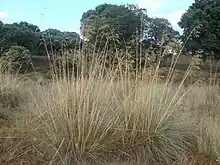Stipeae
The Stipeae are a tribe of grasses within the subfamily Pooidae, with up to 600 described species.[2]
| Stipeae | |
|---|---|
 | |
| Celtica gigantea | |
| Scientific classification | |
| Kingdom: | Plantae |
| Clade: | Tracheophytes |
| Clade: | Angiosperms |
| Clade: | Monocots |
| Clade: | Commelinids |
| Order: | Poales |
| Family: | Poaceae |
| Clade: | BOP clade |
| Subfamily: | Pooideae |
| Supertribe: | Stipodae |
| Tribe: | Stipeae Dumort. (1824) |
| Genera | |
|
28 genera, see text | |
| Synonyms[1] | |
| |
Description
The defining morphological features of the Stipeae include single-flowered spikelets lacking a rachilla extension, and the lemmas (the external bract) have either a sharp point or a terminal awn (long bristle).[3]
Genera
The tribe includes 28 genera:[1]
- Achnatherum (syn. Aristella)
- Aciachne
- Amelichloa
- Anatherostipa (syn. Nicoraella)
- Anemanthele
- Austrostipa
- Celtica
- Eriocoma
- Hesperostipa
- Jarava
- Lorenzochloa
- Macrochloa
- Nassella
- Oloptum
- Ortachne
- Orthoraphium
- Oryzopsis
- Pappostipa
- Patis
- Piptatheropsis
- Piptatherum
- Piptochaetium
- Psammochloa
- Ptilagrostis
- Stipa
- Stipellula (syn. Stipella)
- Timouria
- Trikerala
Many species initially placed into Stipa have now been split off into new genera. Some recent papers have analysed relationships within and between the genera,[4][5][6] but a complete analysis has not yet been performed. Stipoid grasses use the C3 photosynthetic pathway and live in temperate areas worldwide.[7]
References
- Soreng, Robert J.; Peterson, Paul M.; Romaschenko, Konstantin; Davidse, Gerrit; Teisher, Jordan K.; Clark, Lynn G.; Barberá, Patricia; Gillespie, Lynn J.; Zuloaga, Fernando O. (2017). "A worldwide phylogenetic classification of the Poaceae (Gramineae) II: An update and a comparison of two 2015 classifications". Journal of Systematics and Evolution. 55 (4): 259–290. doi:10.1111/jse.12262. ISSN 1674-4918.

- Barkworth ME, Arriaga MO, Smith JF, Jacobs SWL, Valdes-Reyna J, Bushman BS (2008) Molecules and Morphology in South American Stipeae (Poaceae). Systematic Botany 33(4), 719-731.
- Cialdella AM, Giussani LM, Aagesen L, Zuloaga FO, Morrone O (2007) A phylogeny of Piptochaetium (Poaceae : Pooideae : Stipeae) and related genera based on a combined analysis including trnL-F, rp116, and morphology. Systematic Botany 32(3), 545-559.
- Barber, Janet C.; Hames, Kasey A.; Cialdella, Ana Maria; Giussani, Liliana M.; Morrone, Osvaldo (2009). "Phylogenetic relationships of Piptochaetium Presl (Poaceae: Stipeae) and related genera reconstructed from nuclear and chloroplast sequence datasets". Taxon. 58 (2): 375–380. doi:10.1002/tax.582005. ISSN 0040-0262. pdf
- Jacobs SWL, Bayer R, Everett J, Arriaga MO, Barkworth ME, Sabin-Badereau A, Torres MA, Vazquez FM, Bagnall N (2007) Systematics of the tribe Stipeae (Gramineae) using molecular data. Aliso 23, 349-361.
- Jacobs SWL, Everett J, Barkworth ME, Hsiao C (2000) Relationships within the Stipoid grasses (Gramineae). In 'Grass Systematics and Evolution.' (Eds SWL Jacobs and J Everett) pp. 75-82. (CSIRO: Melbourne)
- Romaschenko K, Peterson PM, Soreng RJ, Garcia-Jacas N, Futorna O, Susanna A (2008). "Molecular phylogenetic analysis of the American Stipeae (Poaceae) resolves Jarava sensu lato polyphyletic: evidence for a new genus, Pappostipa". Journal of the Botanical Research Institute of Texas. 2 (1): 165–192. JSTOR 41971613.
{{cite journal}}: CS1 maint: multiple names: authors list (link) pdf - Thomasson, Joseph R. (2005). "Berriochloa Gabeli and Berrichloa Huletti (Graminae: Stipeae), two new grass species from the late miocene Ash Hollow Formationof Nebraska and Kansas". Journal of Paleontology. 79 (1): 185–199. doi:10.1666/0022-3360(2005)079<0185:BGABHG>2.0.CO;2. ISSN 0022-3360. pdf
External links
- Stipa L. sensu lato (sensu lato refers to the tribe) The grass genera of the world website by L. Watson, T.D. Macfarlane, and M.J. Dallwitz
This article is issued from Wikipedia. The text is licensed under Creative Commons - Attribution - Sharealike. Additional terms may apply for the media files.